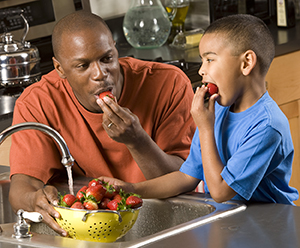Nutritious Foods and Drinks for Your Child
Try to serve your child foods from all the food groups every day. Give your child many kinds of healthy foods from each group to help learn to like new tastes. And set some limits on food and drinks that have a lot of sugar.

Putting it all on the table
Do you want to know more about eating from all the food groups? Here are some specific foods to try:
-
Vegetables. Leafy greens (like lettuce and spinach), tomatoes, broccoli, cauliflower, carrots, peppers, squash, and corn.
-
Fruits. Apples, oranges, bananas, grapes, watermelon, berries, peaches, and pears.
-
Whole grains. Brown rice, quinoa, oats; breads, crackers, and pasta that lists whole wheat on the package, not just wheat. If the first words on the list of ingredients are whole wheat, whole corn, or whole oats, it's better for your family.
-
Lean protein. Chicken, turkey, fish, lean beef, pork, nuts, seeds, beans, lentils, and soy foods.
-
Dairy. Milk, cheese, and yogurt. These can be high in fat. If your child is 2 or older, look for the words low-fat or nonfat on the package. Eating less fat can help kids maintain a healthy weight as they grow.
More great ideas
When you stick to a few good ideas, you won't feel like there's too much to keep track of. Here are some other ideas to get you started:
-
Have your child drink more water and milk. Water doesn't have to be boring! Offer kids fizzy water, add an orange slice, or make ice cubes with fun shapes. Growing kids also need milk. Milk gives kids calcium for strong bones and healthy growth. Be sure to give kids under age 2 whole milk, not skim or low-fat. If your child doesn't drink milk, fortified soy beverage (soymilk) is a good alternative or choose low-fat yogurt as part of a meal or snack.
-
Add more fruits and vegetables to your family's table. Fruits and vegetables can taste and look good. They can be easy to prepare and serve. Buy fruits and vegetables fresh, frozen, or canned. Or try growing your own. Serve fresh fruits and vegetables raw. Kids often like the taste of sliced raw fruits and vegetables. Vegetables can also be steamed, roasted, microwaved, or cut up and mixed into stews and soups.
-
Limit foods and drinks that are high in added sugar, salt, and saturated fat. These include pastries, candy, chips, cookies, cheese-flavored snacks, ice cream, soda, fruit juice drinks, and sports drinks. Offer more water and milk instead of soda, juice, or sports drinks. Offer fruits for desserts and snacks when kids want something sweet. Limit salty snacks. And look for low-sodium or salt-free foods when possible.